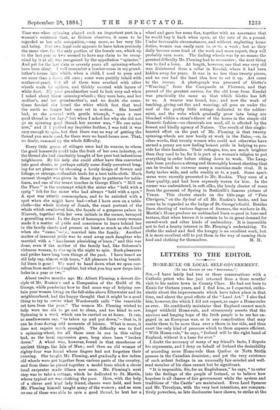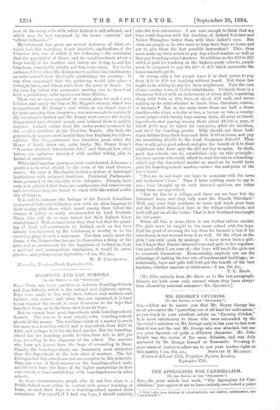LETTERS TO THE EDITOR.
HOME-RULE OR LOCAL SELF-GOVERNMENT.
[TO THE EDITOR Or THE " SPECTATOR."] Sot,—I have lately had two or three conversations with a Catholic priest who has just returned from a three months' visit to his native town in County Clare. He had not been to Ennis for thirteen years, and I find him, as I expected, enthu- siastic about the improvements which have taken place in that time, and about the good effects of the "Land Act." I also find. him, however, the which I did not expect, as eager a Home-ruler as ever. He confidently maintains that England cannot much longer withhold Home-rule, and strenuously asserts that the anxious and longing hope of the Irish people is to see her en- gaged in an European war, or in any complication that may enable them to be more than ever a thorn in her side, and thus exert the only kind of pressure which to them appears efficient. "With Home-rule," he says, "Ireland will be the right hand of England, without it a bane for ever."
I doubt the accuracy of many of my friend's facts, I dispute his arguments, and I deny on behalf of Ireland the desirability of according more rfome-rule than Quelec or NOVA Scotia possess in the Canadian dominion; and yet the very existence of such ardent feelings in an unusually fair-minded and well- read member of his class cannot but be significant.
"it is impossible, Sir, for an Englishman," he says, "to enter into the feelings of the people of Ireland, or to believe how hopeless is all chance of fair government while the system and traditions of the Castle' are maintained. Even Lord Spencer and Mr. Trevelyan, with the very beat intentions, are compara- tively powerless, as late disclosures have shown, to strike at the
root of the many evils with which Ireland is still afflicted, and which may be best expressed by the terms 'coercion' and 'official ruffianism.'"
My informant has given me several instances of what cer- tainly look like irritating, if not impolitic, applications of the Coercion Act, one of which is the following :—He maintains that the population of Ennis and its neighbourhood, where a large family of his brothers and sisters are living, is, and has lung been, remarkably orderly and free from crime. Yet in the autumn of l83, when Mr. Kenny was to address his constituents, an order arrived from the Castle prohibiting the meeting. It was then announced that the gathering would take place a fortnight later, and fifteen miles from the town of Ennis. On the very day before this postponed meeting was to have been held, a prohibitory order again came from Dublin.
There was no cause apparent or reason given for such a pro- hibition, and surely the fear of Mr. Biggar's oratory, which was to supplement Mr. Kenny's, and which, as my friend says, is far more amusing than dangerous, was not enough to explain it. My informant's brother and Mr. Kenny went among the deeply disappointed and offended people, and induced them to quietly disperse. Ireland. suffers from the undue power possessed by the exaylicio members of the Poor-law Boards. She feels the grievance, it appears, more keenly than does England, her fellow- suRerer. The disappointment was therefore great when the House of Lords threw out, quite lately, Mr. Dwyer Gray's " Poor-law (Ireland) Amendment Act ;" and thus, as how often before, are agitators furnished with another telling plea in favour of separation.
When the Canadian provinces were confederated, it became a question as to what should be the form of the local Govern- ments. Sir John A. Macdonald desired a system of municipal institutions with enlarged functions. Provincial Parliaments were preferred by the majority of the delegates. Already, how- ever, is it admitted that these are cumbersome and unnecessary, and sometimes they are found to clash with the central autho- rity at Ottawa.
It is well to compare the feelings of the French Canadians (conquered Celts and Catholics, and with an alien language to boot) to-day, with those which raged among them before the change of policy so nobly recommended by Lord Durham. Those who will do so may indeed feel their highest hopes strengthened. Well assured must they then feel that the grant- ing of local self-government to Ireland, such as has been already foreshadowed by Mr. Gladstone, is worthy to be the crowning glory of such a statesman. For then surely must the dream of the Home-rulers become to themselves a thing of the past, and as unnecessary for the happiness of Ireland as, from a national and cosmopolitan standpoint, it would be retro- gressive, and perhaps even deplorable.—I am, Sir, &es



































 Previous page
Previous page